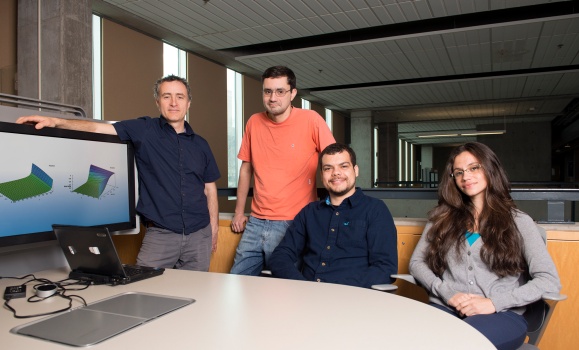FCS News
» Go to news mainThe Noise From Brazil

If you've spent time in the Faculty of Computer Science lately you’ve probably heard a lot of Portuguese. Among the many cultures within the Faculty, Computer Science has welcomed Brazilian students into the mix. Research projects involving Brazilian companies and universities have been springing up all year, and the ongoing relationship with our counterparts down south has been getting stronger. Â
The growing relationship is due to new government initiatives that are allowing students to expand their horizons around the globe. In Brazil the Science Without Borders initiative has seen the investment of 3.6bn Reals ($1.7bn CAD) to send thousands of Brazilian students to different countries around the world. The program will help further their education in science and technology. A Canadian consortium of four universities, Calgary, Laval, ±«Óãtv and Ottawa (CALDO), will be the main recipient in Canada for these students.
Canada has taken an interest in Brazil with a program intended to promote Canadian exports and innovation. The International Science and Technology Partnerships Program (ISTPP) represents a five-year, $20 million dollar commitment to increase the international competitiveness and prosperity of Canada by building stronger science and technology relationships with Israel, India, China and Brazil. The ISTPP will foster and support bilateral research projects with potential for commercialization between Canada and partner countries.
In FCS, three researchers are welcoming these new initiatives by Canadian and Brazilian governments, and have already partnered with Brazilian collaborators.
Dr. Stan Matwin, Director of the Institute for Big Data Analytics, and ±«Óãtv biologist Boris Worm are currently working with partners at the University of São Paulo on a project applying visualization techniques to environmental and marine biology data. They’re also working on another project that involves working companies from Brazil, Ontario and the Federal University of Pernambuco. Together they will study the advantages of ship tracking data. Developing the tools to analyze ship trails will enable the detection of anomalies that may reveal further information such as fishing practices or recent trips to problem areas. It could also enable the intelligent management of traffic at the entrance to ports.
Dr. Derek Reilly is another FCS researcher with Brazilian connections. One of his researcher projects focuses on a neurological and psychiatric care institution in Brazil. He’ll study how technology can facilitate the transition of residents from the institution into broader society. Sponsored by Boeing and Mitacs, and involving researchers at UBC, OCAD University and UFS Car (Brazil), the project is part of a larger and growing research relationship. This is a flagship project within the recently formed Brazilian Visual Analytics (BRAVA) Initiative, which promotes collaboration among Brazilian and Canadian Visual Analytics researchers through collaborative workshops and student exchanges. Through BRAVA, Derek has entered into further collaborations with Brazilian researchers in the areas of interactive visualization of road traffic and indoor location tracking.
 Â
Dr. Evangelos Milios specializes in the area of Visual Text Analytics and Text Mining. He’s taking his expertise and heading up another FCS Brazilian project with funding from CALDO and the Canada-Latin America and the Carribean Research Exchanges program (LACREG) of the Association of Universities and Colleges of Canada. Together, with the help of the University of São Paulo in Brazil, Milios will try to assist both national governments in making government data more open and accessible. The transcripts of parliament in both countries offer a high quality source of text that represents the policy commitments of each respective government. Finding a way to correlate these commitments with the reality of implementation as announced, commented on, or described in mainstream media is a great challenge for researchers. The project will involve journalists from the University of Kings College as well as computer scientists in both countries.
Perhaps in the past Brazil was known better for soccer, samba and sunny beaches, but this is fast giving way to a future in which they will also be known as a leading force in science and technology. A future, that ±«Óãtv University is very much a part of. Â
Recent News
- Calling all gamers: develop your own video game at Global Game Jam 2025
- Computer Science student’s startup promises to make driving safer
- Future alumni: Seif Elbayomi
- Computer Science alum says mentorship is a powerful tool
- Protecting our health, oceans, and future: Dal innovators celebrated at 22nd annual Discovery Awards
- Dal researcher is making smart home devices safer
- Tech triumph: ±«Óãtv wins big at 2024 Digital Nova Scotia awards
- Dr. Rita Orji wins Arthur B. McDonald Fellowship, NSERC's most prestigious prize for early‑career researchers
